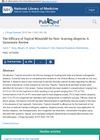Serious Complication of Low-Dose Oral Minoxidil for Hair Loss
October 2022
in “
JAAD case reports
”
TLDR Low-dose oral minoxidil can cause serious heart complications.
A serious complication of low-dose oral minoxidil for treating female androgenetic alopecia has been reported, specifically pericardial effusion. Although adverse effects are generally considered infrequent and minor, a case involving a young, healthy female patient developed pericardial effusion within weeks of starting a 1.25 mg dosage. Symptoms included shortness of breath, chest pain, and leg swelling. This suggests that pericardial effusion may be an inherent risk of minoxidil's mode of action, particularly as a potassium-channel opener. Physicians should prescribe and monitor this treatment cautiously, and unsupervised consumer use is discouraged for safety reasons.








